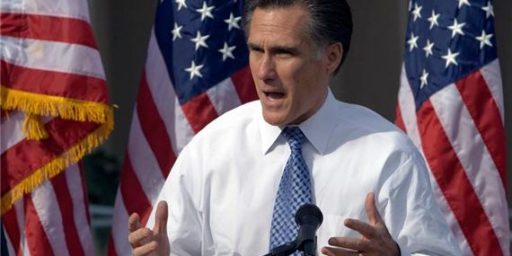The Era of Limited Government is Over
William Voegeli notes that, despite railing against big government for more than a quarter century, conservatives have done nothing to stop it. Some excerpts from an unusually long WSJ op-ed:
A quarter century ago president Ronald Reagan declared in his first inaugural address: “In this present crisis, government is not the solution to our problem; government is the problem. . . . It is my intention to curb the size and influence of the federal establishment and to demand recognition of the distinction between the powers granted to the federal government and those reserved to the states or to the people.” In 1981, the year of that speech, the federal government spent $678 billion; in 2006, it spent $2,655 billion. Adjust that 292% increase for inflation, and the federal government is still spending 84% more than it did when Reagan became president–in a country whose population has grown by only 30%.
To put the point another way, if per capita spending after 1980 had grown at the rate of inflation, federal outlays would have been $1,883 billion in 2006 instead of $2,655 billion. The 41% increase from 1981 to 2006 is considerably lower than the 94% increase in real per capita spending in the previous 25 years, from 1956 to 1981. In the past two decades, the federal establishment grew steadily, rather than dramatically. Nonetheless, Reagan’s pledge to curb the government’s size and influence has hardly been fulfilled. Inflation-adjusted federal spending increased in every year but two over the past 26 years.
[…]
The numbers confirm what every despondent conservative already knows. Since Reagan’s stunning victory in 1980, conservative journals have annihilated forests to print articles about excessive government spending. Conservative think tanks have produced sweeping plans for reducing the welfare state. Republicans occupied the White House for 18 of the 26 years after 1980, and held a Senate majority for 16 1/2 years and a House majority for 12 years. Yet the result is a federal establishment bigger and more influential today than in 1980.
And it’s not military spending, the War on Terror, or any such conservative-approved rationale that is to blame here; the rise has come almost entirely in entitlements and other social welfare programs. The problem, as Voegeli explains at length, is that Republicans haven’t been willing to expend the political capital to fight against these programs and thus wind up, at most, arguing about the size of the increase. Indeed, most conservatives have accepted as a matter of fact the existence of a welfare state and are now just haggling over price.
His solution, frankly, isn’t much of one:
It makes sense for conservatives to attack liberalism where it is weakest, rather than where it is strongest. Liberals sell the welfare state one brick at a time, deflecting inquiries about the size and cost of the palace they’re building. Citizens are encouraged to regard the government as a rich uncle, who needs constant hectoring to become ever more generous. Conservatives need to make the macro-question the central one, and to insist that limited government is inseparable from self-government. To govern is to choose. To deliberate about the legitimate and desirable extent of the welfare state presupposes that we the people should choose the size and nature of government programs, rather than have them be chosen for us by entitlements misconstrued as inviolable rights.
No political strategy can guarantee success. Under no foreseeable set of circumstances will liberals fear giving voters their spiel: We want the government to give things to you and do things for you. Conservatives can only reply that single-entry bookkeeping doesn’t work; every benefit the government confers will correspond to a burden it has to impose. A government that respects citizens as adults will level with them about the benefits and the costs. A conservatism that labors to reverse liberalism’s displacement of Americans’ rights as citizens with their “rights” as welfare recipients may not achieve victory, but it will at least deserve it.
He’s right, I think, on how to conduct the debate. Ultimately, though, it’s a losing position. He quotes Robert Samuelson’s recent line, “Most Americans . . . think that they automatically deserve whatever they’ve been promised simply because the promises were made.” Green eyeshade arguments aren’t going to be very effective in combating that sense of entitlement.
Aside from frustration over the bipartisan foreign policy consensus of constant military engagement around the world, the yearning for small government conservatism is perhaps the biggest issue driving the zeal for Ron Paul. There has been precious little evidence in the last quarter century or so, though, that a passion for self-sufficiency exists in anything close to a majority.




The number of problems with transforming “small government” from a campaign slogan to policy is legion. For one thing, neither Democrats nor Republicans have any particular aversion to spending money. They just differ on how they want to spend it.
Another problem is that the permanent bureaucracy functions as inside salesman. Administrations come and administrations go but the bureaucracy remains forever.
My own view is that the policy position should be towards accountable government rather than small government and that, in turn, IMO requires devolution. The sorry state of state and local government makes that a hard sell.
“Railing AGAINST limited government,” indeed. Even the unconscious has turned against them.
Heh. I changed the sentence around but screwed up the editing.
What is impressive is the number of liberals who support Ron Paul’s conservative principles. It would be nice to have an honest man that all can respect using the bullypulpit to combat liberal/neoconservative big government policies.
>He’s right, I think, on how to conduct the
>debate. Ultimately, though, it’s a losing
>position.
If true, then our national debate is essentially and argument over whether to drive off a cliff at 35 mph or 65 mph. If that is the case, what’s the argument for continued involvement in politics at all?
A minimum wage law that accurately reflected the cost of living would eliminate the need for many of these expensive entitlements. But, that idea is anathema to both liberals and conservatives. I can certainly understand their position, after all, who wants to put the cost of maintaining a decent standard of living onto our nation’s employers instead of the public in general? Just think of the consequences. Some rich families might have to get by on just one private jet, and the working poor might disappear. No more gardeners, dishwashers, and nannies whose wages have to be supplemented by welfare.
Your contention is that most minimum wage employees are doing personal services for the hyper-wealthy? Don’t almost all of them work in the service industry, often for small businesses? Heck, even McDonald’s pays more than minimum wage just to attract teenage workers.
The people I know with nannies are paying far, far more than minimum wage. Granted, the cost of living in the DC Metro area is high and there’s a scarcity of people available for nanny duty. But most are making quite decent incomes.
I don’t have a full-time maid or gardener but I do pay people to do house cleaning and to mow the lawn once a week. They’re making a heck of a lot more than the minimum wage, believe me.
“I don’t have a full-time maid or gardener but I do pay people to do house cleaning and to mow the lawn once a week. They’re making a heck of a lot more than the minimum wage, believe me.”
You have made my point. Minimum wage is so far below an actual “living wage” that the boast “I pay more than minimum” is easy to make and meaningless. Try covering housing, transportation, food, medical care, clothes, etc. on $10 or $12 per hour and see how it works out. Minimum is what..less than $8.?
It’s $5.85, actually. I’m paying multiples of that, though. (The work is on a contract basis rather than an hourly basis, but that math isn’t that complicated.)
The couple who cleans our house have managed to put their kids through college, as has the man who owns the lawn service company we use, as has our painter-handyman, and our exterminator. People who do good work can make a decent living and, more importantly, give their kids a leg up on getting more fulfilling, higher paying jobs.
Shifting the conversation to your personal generosity and the circumstances of a few does not relieve the situation or do anything to eliminate the need for entitlements to America’s working poor.
I’m not claiming exceptional generosity here: We’re paying the going rate. We’ve got a large Latin American immigrant population, which drives wages for these jobs down, but there’s a strong demand for these services.
The working poor aren’t entrepreneurs but rather low skill employees in the service sector. But dishwashers and stockers and the like simply can’t command $20 an hour salaries. It’s not a matter of rich people hording the money for themselves, it’s simple economics: You can’t pay an employee more than he generates in revenue.
It’s a truism that the poor will always be with us. The information age economy probably makes that more true than ever because there will be a segment who simply can’t acquire the necessary skills. But simply decreeing that every job, now matter how little it contributes to the bottom line, should merit enough pay to live a middle class lifestyle won’t work.
Equating subsistence wages with middle class lifestyle doesn’t work either. Decreeing that every American adult who works full time should be making a “living wage” is not the same as decreeing a middle class lifestyle for all. If we stick to the real reason for welfare and entitlements–keeping labor down without raising wages, and passing the cost on to taxpayers–we wouldn’t be talking in circles.
People who do good work will be recognized and the value of their labor will rise. I’ve worked since the age of 12 at a diverse number of jobs, many of them low paying service jobs starting with paperboy.
The intent behind having minimum wage laws is a desire to see social justice. While I couldn’t agree more with the intent, the mimium wage as a policy is a failure just like many other similar well intentioned interventions into the free market. It actually hurts poor people.
The result of having a minimum wage is to cause inflation, lower job growth, reward bad service, punish virtue, and hurt all people who rely on fixed incomes, such as the elderly. Let’s stop subsidizing people who really don’t want to work.
You have to use the power of everyday obervation and common sense rather than dealing in abstract theories. The academic doesn’t jive with reality.
Have you noticed the attitudes of most minimum wage earners in service jobs? You can’t fall below it and one minimum wage job is equal to any other. You basically can’t be fired from the minimum wage so there is not incentive to provide good service. Let’s not be politically correct here.